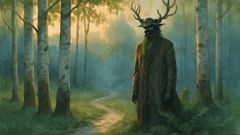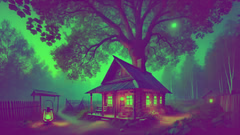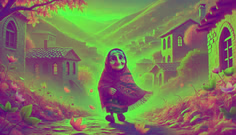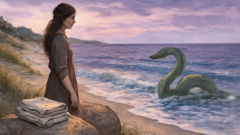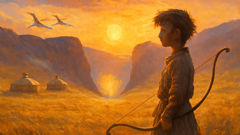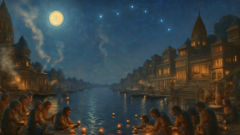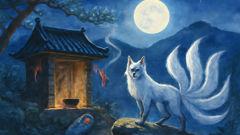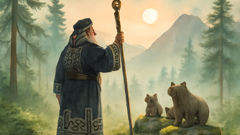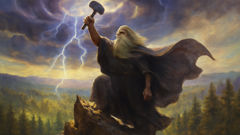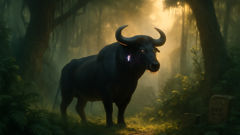Introduction
There are places on the old maps where ink thins to mere breath, where a green wash suggests trees but spares their names. North of the hum of markets and winter roads, past fields that forget the plough after harvest, rises a forest that behaves like weather. One day it looks near; the next it has drifted far. It is not a forest that endures people. It watches them, tests them, becomes a thousand shadows just to hear how a mortal heart answers its rustling riddles. In the villages ringing that green sea, elders still leave a slice of black bread and a pinch of salt on a threshold, not for the stray dog or the neighbor’s child, but for the one who is older than any family tree: the Leshy, the Lord of the Woods, whose laughter sounds like a gust tearing through pine crowns and whose temper is as hard to predict as spring thaw on a river with a memory. They say he can be tall as a fir, stooping clouds with his horns, or small as a squirrel cracking hazelnuts between his teeth. He can wear bark like a coat and moss like a beard, and he walks with one boot reversed and one foot bare, so even his tracks lie. Travelers who forget their manners find paths that loop back into themselves, mushrooms arranged in rings as if the forest planned a feast without them. Those who remember to greet the trees, to step lightly and to listen—well, they are not spared tricks, but they’re spared harm. This is the story of how a young mapmaker named Semyon learned to measure a forest whose ruler enjoys mismeasurement, and why the map he returned with could not be printed the way the merchants wanted. It begins when winter had fled but left crumbs in the shadows, when the sap woke under the bark and the wild geese wrote black letters across the Russian sky.
Into the Green Labyrinth
Semyon was the sort of man who believed a good line could quiet the world—river lines, ridge lines, the steady lines you lay on paper the way a farmer lays furrows. He had learned his letters by tracing contours and his prayers by following a district road marker to its end and back again. His mother sold flax by the yard; his father had once been a trapper and had the careful silence of a person who knows how far a fox will hear the wrong step. By nineteen, Semyon owned a waxed roll of vellum, a quiver of goose-feather pens, and a compass whose needle searched for north the way a hound scent-searches for its master. In late April, when the river freed its hands and tugged itself out from under the ice, the grain-merchant Yevstigney brought him a job. “The wood beyond Slobodka,” the man said, “is thick and thickening. I need routes for my wagons that don’t sink in spring and don’t disappear by snow. Map me three tracks to the Morozov sawmill and I’ll pay you in silver and salt. Mind the bogs and mind the Leshy. The forest keeps a book of names, and he’s its librarian.” Semyon laughed then, but not out of mockery—out of the thick nervous laughter of a man who knows folk-wisdom has kept families alive longer than science has kept candles burning. He shouldered bread, salt, and a skin of kvass, tucked into his belt a loaf-end still warm from dawn oven heat, and laced his boots tight as promises.
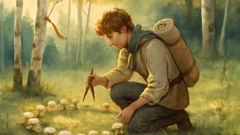
The old women had instructions. “Don’t whistle,” Nastasya cried from her fence, shaking a broom that looked like it had once belonged to a birch. “The Leshy whistles better. Don’t count the trees—he hates that. If you get turned around, turn yourself around. Put your shirt on inside out and your boots on the wrong feet. He can’t follow a person who refuses to follow himself. And take a thread of red—that confuses the little ones.” Semyon, who had resisted learning the Lord’s Prayer by always adding birds, rivers, and a bit of compasses to it, did not resist Nastasya’s rules. He looped red thread around his wrist, stowed the bread and salt where he could reach them quickly, and set off under the long white ribs of the birches flaring beyond the last thatch and their smoke.
The first hour was ordinary. The sun rose like a copper coin from a samovar’s mouth. Ants stitched earth over their winter holes, and a woodpecker hammered a message that sounded like the forest counting its own rings. Semyon noted a ridge where pines shouldered out the birches, where the ground pitched just enough to keep water moving even if the thaw came down like a crowd, and he noted a low seam of alder promising bog. He moved like a man humming a tune too quiet to bother anyone, an apology and an introduction in one. He stopped at the first old stump he saw, laid down his bread and salt, and whispered, “Master of the Forest, I won’t take more than I can carry. I won’t talk loudly. I’ll close gates I open.” The wind answered in many voices. A pine gave its long breath; an owl, caught out late, swore softly. The birches stood like women in white shirts, facing each other with secrets on their lips, tutting at the men who believed they ruled. He felt watched, but not by anything that wanted to eat him.
After the second hour, the ground became sly. Paths saw him and crossed their legs. Deer-tracks braided, unbraided, and tied themselves into figure-eights that would have made a dancer blush. The river sound shifted places with the branch-scratch overhead, and when he followed water, he found wind; when he followed wind, he found nothing but nettles and the smell of metal where lightning had changed the very letters in the soil. He marked what he could in pencil, not ink—a prudence he didn’t know he was borrowing from the forest itself—and he refused to count the birches even though they lined up like men ready to be counted in a yard. When he whistled, soft, habit, because a man wants to be his own birds, a colder whistle answered. It was not unkind, just amused, as if a fox listened to a poem about foxes.
Semyon stopped. He took off his linen shirt—the day was warm enough by now—and turned it inside out. He swapped his boots right to left. He took the red thread and tied it around a sapling the way a lover might promise return. Then he walked sideways until the world decided what was forward again. He did not try to make sense of how the path rearranged itself; he did not scold his compass when the north needle slid toward a patch of moss glowing like the inside of a melon. When a circle of mushrooms appeared, neat as a wreath on a saint’s head, he stopped outside it and nodded. “I brought salt,” he said, and set a pinch in a clean leaf near the largest cap. In that instant, the light changed. It did not dim, but the greens leaned closer to blue, and the birch paper peeled from the trunks in strips more like a fisherman’s discarded scales than bark. Something moved to his right, not heavy enough for a bear and not light enough for a hare. Semyon kept his eyes low, respectful, the way one looks at a priest’s vestments and not his private face. He said, “I’ve come to make lines. I’ve come to leave the places alone that want to be left alone.” The movement stopped. The forest exhaled.
By late afternoon the map he’d begun looked like a conversation between two careful men who don’t yet trust each other. Semyon reached a glade where sunlight pooled and ran away each time a cloud crossed, where the ground was soft with last year’s leaves and the old bones of ferns. Here, a low, blackened pine stood like a charred spear. Lightning had come here. On its scorched trunk, someone—no, something—had carved symbols not quite letters, not quite numbers. They were the sorts of signs a river uses to write to its banks: swirls, loops, a broken clasp, a knot undone and retied in another place. He touched one and felt a small shock as if his finger had found a bee that hadn’t accepted winter’s argument. “You read, then,” he said under his breath. “So do I.” He laid his compass at the base of the burnt tree and filled his mouth with silence. In the silence came a smell—not decay or blossom, but the thin, sharp scent of iron when you slip your wedding knife open. A shadow crossed the sun; a cloud ran over it; the shadow didn’t leave.
Bargains with Bark and Shadow
The Leshy appeared the way dusk appears: as an adjustment to what you thought you knew. Semyon raised his eyes without lifting his head, and found a man and a tree pulled together by a craftsman with a sense of humor. The creature was tall enough to worry the clouds, then short enough to sit his leaf-tangled weight on the scorched root, then a size in between, as if he was trying on bodies like coats. He wore a jacket of bark peeled and plaited, and his beard was moss threaded with last autumn’s cinnamon ferns. His eyes were dark green with a bit of copper in them, like a lake remembering its iron bed. Antlers rose from his brow and then didn’t, the way one word in a sentence sometimes hides inside another. He smelled of sun-warm needles and animal, of old snow and nettles boiled for soup. His smile was a slit in bark with teeth behind it that were not human but also weren’t beast.
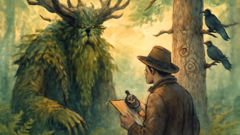
“You brought salt,” the Leshy said in a voice built of wind through a dozen mouths—the world’s oldest pipe organ. “You didn’t whistle loud. You turned yourself inside out before I had to. For a creature who draws straight lines, you greatly prefer not to be straightened.” He dipped a finger into Semyon’s salt leaf and touched his tongue, the way someone would taste a strawberry grown at the edge of a graveyard. “You could have been born in my house.”
Semyon swallowed. He did not gape. He did the thing that has kept mortals walking out of wild places since the first winter: he decided to speak as if to a neighbor with the power to make his roof leak or catch fire. “Master of the Wood,” he said, using the title his mother’s neighbor had used to settle bad wind in her stove, “I need three routes to a sawmill. If I can find three, the wagons will stay to three. If not, they will wander everywhere they can roll. I don’t want to put tendons to the axe that holds your ribs together.”
The Leshy laughed. It wasn’t terrible, but it wasn’t safe. It was the laugh of a river that has convinced itself it can’t be dammed. “You think the wagons will obey ink any more than the wolves obey fences? But I like that you want to compel them into courtesy.” He glanced at the burnt trunk and tapped one of the not-quite letters. “Do you read this?”
“I read intent,” Semyon said carefully. “I read water wanting down. I read frost at work in a stone. I read which path would catch a wheel and which one would carry it. I don’t read your language. But I could learn.”
“You would learn?” The Leshy’s antlers came back then, two branches of dusk widening into evening. “What would you pay for it?”
Semyon thought of merchants and their coin, of his mother’s hands and their lines like dry riverbeds. He thought of how a man pays for knowledge if he doesn’t watch his sums: with pride, or with years. “Bread. Salt. A story your children can chew. Work.”
The Leshy tilted his head, an owl’s motion in a stag’s shape. “Work,” he repeated. “I have something lost. Not by me. Stolen. I am not offended by theft. Foxes steal. What annoys me is spent magic returned to me as iron. A forester came here in winter. He wore a wolf’s hide as if he had a right to it. He took from my tree a thing I use to disturb men who need disturbing. A compass that points where I tell it to point. I lent it, and he kept it. He gave it to a merchant to keep the forest predictable and to make it tame. I dislike tame.” The Leshy leaned close enough that Semyon could count the lichens in his beard. “Get it back.”
Semyon blinked. He could picture the man. There was always a man like that in every dozen: the one who arrived with his calm already accomplished, who would never realize the world had taught him one song and then stopped, while it kept writing. “Where?”
The Leshy grinned. It wasn’t pleasant. It wasn’t unkind. “If I knew ‘where’ I wouldn’t need you to find it. But I will tell you this: the man keeps his courage in a bottle and his compass under his bed. His wife has three braids like wheat and she is tired in her bones and not in her skirts. His house sits where the wind stops to butter its bread on the ridge. He will be gone today. His lunch is in a tin pail with blue enamel. Bring me what is mine, and I will walk you through nine wrong turnings without one right one. Bring me what is mine and I will make your tamed lines clever. I will put pockets in them where men forget greed.”
Semyon stood. He bowed—not so low that he’d look like a supplicant, not so curt as to look like a fool. He shouldered his roll and tucked the salt back in its pouch. “If I can’t find it?”
“Then I’ll whistle,” said the Leshy, and his mouth bent into a shape that could have been a promise or a threat. “And you’ll follow the whistle until you remember you were born of women who bar their doors at night.”
It’s a simple thing to describe a Russian village if you’re in a good mood: white smoke, gray roofs, brown dogs, green yards, a blue strip of sky where the church paints the Virgin’s robe on Sundays. If you’re not in a good mood, you list the mud and the men who drink through it, and the sound of quick hands counting other people’s work. Semyon was in a good mood because he’d been paid attention to by the forest’s memory. He walked to Slobodka by a route the Leshy somehow made short—whether Semyon’s feet lengthened or the road contracted, he couldn’t say—and he found the ridge the way a dog finds the thought of soup: by sniffing. The forester’s house sat with its back to the wind. The window was closed and the cat on the sill had the look of a creature that recognizes the threshold between two kinds of home.
He didn’t break anything. He never did. He found the pail with blue speckles by the doorstep and knew by that ugly color he was in the right place. Inside smelled like woodsmoke and old onions and a little like fox, because a man carries what he hunts under his tongue. Under the bed, a wooden box with a squealing hinge held the compass like a bride you’d rather not marry. It wasn’t a handsome compass. It had a pewter case dulled by sweat and a glass that had eaten two scratches and was busy digesting a third. But it had hunger in its radio-silent face—the needle pointed not north but toward Semyon’s hand in the exact instant he thought, I cannot be caught. The device wanted use like a winter stove wants feeding. He pushed it into his pocket and left a coin in the box and a slice of bread on the table because he had been raised not to take a whole and call it forced halves.
The wife stepped from the back room then, the three braids indeed heavy as wheat. She saw Semyon; she saw the box; she saw the perfect criminal way he stood as if he had dust on his feet and was trying not to bring it in. She balanced her worry against her anger and set them both down without crying. “He took it from the forest,” she said, as if saying so made her trustworthy to the air itself. “He said it would keep him from getting lost. I told him to learn how to be found instead. Will you bring it back?”
“Yes,” Semyon said. “You should move your bed to the other wall. The wind pushes your husband wrong when he sleeps that way.”
She smiled at that, a quick split in the day’s bread. “I would move the house if men let houses be moved. Go quickly.”
The return was not swift. The Leshy had told the truth: he didn’t know ‘where,’ and now, having cheated distance once for Semyon, he demanded ordinary feet obey ordinary miles. Semyon kept the wrong compass in one pocket and his own in the other. The wrong one pulled, as if a fish held the other end of the line in its mouth and was making tight circles for fun. He crossed a field where frost still lived in the shadows and a shepherd girl sang to a flock that could have been clouds if they’d lifted their heads. He crossed a stream where last year’s grass lay combed flat in the water, colored like tea brewed twice. He crossed himself without thinking when a rook flew so low its shadow tried on his face. It was nearly evening when he reached the burnt pine and the not-not-letters and the place where the air turns inside its shirt when it wants to laugh in private.
The Leshy took the compass without touching Semyon. The device did not resist him the way it had the human it had been ordered to obey. He slipped it into the charred trunk where it vanished as if the wood had been saving its place. “Good,” the forest spirit said. “You have the hands of someone my people would like—I mean, the hands don’t always steal.” He glanced toward the west where the sun unfastened its coat one button at a time. “Now, let’s go wrong correctly.”
What followed was a lesson in walking by faith with a teacher who enjoys making faith sweat. Semyon went left when his eyes said right and up when his legs insisted down and under when his back longed for sky. The Leshy moved alongside him and also everywhere, the way fog makes a second river above a river. He told Semyon the names for things in a tongue that kept changing its alphabet: the old name for the bog that looked clear and the newer name for the hill that only pretended to be a hill because the bedrock underneath had its mind on river work. Semyon learned that a path’s first star is not north but a particular birch with a lightning scar shaped like a crooked ‘L’. He learned to listen to pine needles fall and hear if each one hit in an honest way or if a sprite had tied the air in knots to tease him. He learned the short prayer you say to the wolf in the morning to convince him you are not the meal he has been waiting for all night.
When at last the Leshy halted, they stood at the rim of a hollow where fog gathered like milk in the early hour. A child slept there, wrapped in a shawl the color of fatigue. Her shoes lay side by side, already polite before instruction. A hare sat near her ear as if listening to her dreams and deciding not to repeat them to anybody.
“I was going to bring you to three routes,” the Leshy said, “but one of them is this child and the second is whether you carry her without waking her and the third is whether you take her by the short way that breaks a promise or by the long way that keeps one.”
The Path That Walked Back
Semyon did not ask for the terms. Terms would be there whether he asked or not; the forest wrote its vows in wet places, in hollows, on the underside of stones. He lay down his maps and lifted the girl, who fitted his arms as if someone had measured him for this duty while he was still being sewn together in his mother’s belly. Her breath was damp with caution. Her lashes were ringed with the lightest dust, the way the wings of moths remember the moon. The Leshy walked ahead without walking, his shadow going where Semyon needed ground, his antlers sometimes striking stars that had been waiting all afternoon for night.
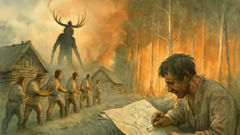
They took the long way. Semyon knew this because the Leshy kept pointing out the short way and then moving it when Semyon’s feet almost chose it. “We promised the bog-lady,” the forest spirit said once, “that we wouldn’t put heavy men on her light skin this week.” Another time: “There’s a fox den under that hill. Foxes have laws when kits are small.” Another: “That stream looks shallow because it’s thinking of last year. Rivers borrow their own memories to deceive.” He said it with the satisfaction of a man reminding himself that time pulls tricks, too, and the forest forgives it. Semyon’s arms learned the girl’s weight and his heart learned the useful pain of carrying something that will not carry itself.
When they reached the village edge, night had got its hands on the fenceposts. A woman stood there with a torch and a face the shape of a hard winter that has decided to be spring anyway. She took her daughter and did not say ‘thank you’ because she had spent three days saying it in her mind and had used up the word the way a mill uses up river. Instead she touched Semyon’s sleeve with care, turned to the dark, and extended her thanks that way, to the one in the bark coat. The Leshy did not stand at the fence. He stood in the orchard where the wind persuades apples to let go.
Semyon went home to a bed that felt borrowed and to dreams that walked out the door each time he opened his eyes to greet them. Morning came with busy elbows. He returned to the forest, to the burnt pine, to his plain work of measuring routes that would keep wagons near dry ground and away from roots that hold the forest upright the way ribs hold a chest. The Leshy came and went, sometimes as large as a metaphor and sometimes small enough to hide under juniper. He showed Semyon three lines that men could follow with dignity and two loops where the greedy would get dizzy; he showed him a ford in a stream that was solid as a thought you have every day and the places where the old world remembers ice and your boots would go numb in three minutes. He made Semyon write on his map names in two languages: the one you speak with your mouth and the one you speak with your boots.
“Write ‘Wolf’s Tooth’ here,” the Leshy said at a rocky point that bit the sky. “Write ‘Old Woman’s Cup’ at the hollow where the rain waits to be reborn. Write ‘Place Where the Wind Practices’ on the ridge and ‘Small Music’ on the run of pines that have mastered singing as well as standing.”
Semyon wrote. He wrote with a care he had not known he could afford. He thought, not for the first time, that rich men poor-out when they refuse old names, that to call a place ‘Parcel 12’ is to draw a knife on your own blood. He brought bread. He brought salt. He brought a song about geese that his father had smoked into a pipe and then forgotten to teach him; the Leshy taught the missing lines. He learned to leave little gifts in little places: a bead in a stump for a magpie, a shred of linen at a crossing, a joke for a crow and a story for a tree.
Then summer burned hard and tired men arrived with saws. They came at dawn because merchants pay for dawn and the day will not argue with coins as well as with prayers. They sharpened their blades on the thought of pay and the pay sharpened itself on the thought of more men to pay it to. The wagons were already improved by Semyon’s routes; they moved easily and without complaint, bearing irons and axes. The Leshy sat on a stump with his long legs crossed and watched as if a play he could have written better had been staged without him. He did not grow. He did not roar. He did something worse: he grew less lookable, as if a smear of fog kept moving between him and anyone else’s eyes. Semyon stood with his maps and felt the excellent inadequacy of good work when hard hunger meets hard wood.
“What do we do?” he asked, because he had a man’s habit of needing to make the old woman of the woods into a committee.
“We do tricks,” said the Leshy. “We do tricks and we do teaching. Men who want to eat their children’s inheritance with sharp iron rarely listen to teaching. So we begin with tricks to make them ready.” He lifted Semyon’s map and blew on it. The vellum breathed like a thin animal in winter. The ink flinched, then settled into a new poise. “I will put in it a fold that was not there,” the Leshy said, “and pockets in the fold and a refusal in the pockets.” He glanced at the men. “Take three of them tonight, after they’ve eaten more spirits than spirit. Bring them to the second loop, where the dizzy happens. Then show them a kindness and a home.”
Semyon did as told. He was not brave. He was ready. He walked among men whose speech had gone furry and whose eyes were trying to become coins. He lured three with the promise of a shorter route to a stash of mushrooms, told them the chant that Nastasya had taught him to keep a person’s feet from forgetting they were feet, then walked them into a loop the Leshy set like a snare. They walked and walked and were pleased with themselves for walking so well. The stars watched. The night bent close as if to hear better. When each man finally realized that the birch with the scar shaped like an ‘L’ had greeted him five times from three directions, he sat down and removed his boots, willing to break himself before being broken by a forest’s joke. Semyon sat too. He took out bread and salt. He passed them around. He did not tell a moral; he told a story about a child found in fog. He told them the map would help them if they promised to walk where it was kind and to take only what their mothers would bless in the morning. The men were dull with drink, but even dull men know when they are being offered a way to keep their hands. They agreed, in the dark, with bread on their tongues.
That was the first pocket in the map. Others followed: a place where saw teeth dulled as if chewing on tin; a draw where the wind decided to live at ground level, forcing men to look up to breathe; a trick of sound that made axe handles hum in church tones if they swung within ten paces of an old oak; a confusion around the stand of birches where the Leshy’s children liked to practice vanishing. Merchants cursed the sudden inefficiency of their days. Semyon’s map—copied, recopied, and sold by men who believed that owning vellum is the same as owning a place—kept its refusals. Copies ironed its folds. Refusals traveled in the ink’s bones. Men adjusted. Men cursed. Fewer trees fell than might have, and the forest remembered the shape of itself with a little relief and a little pride.
There was, of course, a price. Tricks are sweet, but they’re not a diet, even for a spirit. The Leshy’s eyes dullened the way a lake does when the first leaves begin to drop, and his beard grew heavy with burrs and neglect. He spent his anniversaries of winter’s first bite sitting by the burnt pine, tapping the char with a long nail and listening for a note the world owed him. Semyon brought him butter mushrooms fried in sour cream; he brought him a story he’d learned from a priest who didn’t mind living next to pagans; he brought him, once, the laughter of a child caught in his pocket by accident and released under the old tree. The Leshy brightened for an afternoon and went dim again like a coal under ash. “You cannot keep men’s need small by tricks,” he said one evening, when summer had stretched itself out and let the clouds dance on its back. “You can make it stumble. You can make it walk in circles. But need is an honest river. It wants down. You must set stones or teach bridges. Bridges are best. Stones are easier.”
“I cannot tell the merchants to make less,” Semyon said. “They will not listen to my good lines. They’d listen to coin. They’d listen to snowstorm. They’d listen to a fire that doesn’t go out when it reaches their own roofs.”
“Then teach villagers,” the Leshy said. “Teach children. Teach the ones who still believe that foxes have opinions. Teach the ones who’d rather walk around a mushroom ring than through it. They will grow into men who argue better with their bosses. But first, we have to pay for the pocket I put in your map. Pay with our feet.” His smile went thin. “There will be a fire.”
It arrived in August, careless as an afternoon drunk. A grass spark nosed into birch paper peels and found a little feast; pine resin licked its chops and flung doors open. Wind took a side, then changed sides and tried to make up for it by blowing twice as hard in the other direction. Smoke poured over the ground like a second earth, darker and quicker. Semyon heard the sound of rich men’s fear—organized, loud, trying to order flame the way you order a dog. He heard, too, the sound of wild fear—rapid, thin, in the throats of creatures whose map had always been smell and now had none. He ran to the burnt pine and found the Leshy already drinking smoke as if it were wine he had been saving for sadness.
“North,” the spirit said, even as the wind said south. “We make a clever wrong. You and I and thirty villagers, and perhaps the priest if he can remember who his God loved first.” Semyon did not nod because nodding is a waste when tasks speak in the imperative. He ran. He woke people with a knock that was more information than manners. He pinned the map to a fencepost with a knife, and it shivered with the thought of flame, then behaved. He sent the women with the buckets to one edge of the green. He sent the men with wet rakes to the other. He sent the children and the old together to stand where the wind practiced last spring. He sent the priest to bring the icons not because icons stop fire but because icons stop panic long enough for water to get a job.
Then he and the Leshy walked straight into heat. It didn’t accept them. Fire is not a host. But it noticed two creatures walking toward it with a memory in one hand and a refusal in the other, and it made its plans accordingly. Semyon cut a line with his boots where the map told him a line wanted to be—down to mineral earth, around a stand of birches that had never yet lost a child to a storm. The Leshy stood in three places—this is true; more than one old woman saw it and died much later still believing—so that the wind had to step around him and lost its balance and fell for a moment into agreeing. The fire hit a pocket in the map, the one that made men dizzy, and it got dizzy too. It spun. It ate itself a little. It jumped a path where no path had been yesterday and cut itself on stones where stones had footed no work in a hundred years. Semyon ran with a wet cloth over his mouth and the thought that no mother had the right to build a man for this kind of heat, but many had anyway. The villagers formed a line and learned, in one evening, one of civilization’s oldest songs: water passed from palm to palm without questions.
In the end, fire left because it had other things to do. All fires do. They pretend to own a place and then remember that they are only auditions for the cold to come. The forest stood singed in a hundred places and alive in a thousand. The Leshy sat on a stump and let his knees knock with fatigue, which is not a thing spirits confess to. Semyon leaned against the burnt pine and considered lying down and never standing again, then stood, because living is a series of forgivings you give your own legs.
After that night, the village did listen to Semyon. Not because he had shouted louder than anyone else, but because people had seen something impossible behave itself inside his possibility. He taught children how to read two languages: ink and footfall. He taught them to hang small cookies in the branches on the day the first frost writes its name on windows, and to make a little room on the ground with their hands for the creatures that need it. He taught men how to unlearn the habit of winning every argument with an axe. Some unlearned easily. Some never did. Greed still slept under beds and woke when it smelled fresh wood. But the map’s pockets kept working, and the forest’s librarian remembered who had returned a stolen book.
On the day Semyon finished the third route, the Leshy came to the village openly. People believed what they had seen during the fire, and belief makes room where fear had been hoarding. He did not change his size to frighten or comfort. He came as a tall man with a coat the color of duff and antlers that had decided to look like branches out of respect for decorum. He stood in the square and accepted bread and a small salt cellar with a lid shaped like a bird. He thanked the priest for the bells, because bells made men’s spines behave long enough to learn a good habit. He thanked the women for the water. He thanked the children for their eyes. Then he turned to Semyon and said, “Your lines are crooked enough.”
They were crooked, yes—bowing around places that had earned bowing, snaking to avoid a hill too tired for wheels, careful of the old oak whose acorns had taught nine generations the pleasure of a bitter thing. They were crooked in a way that allowed wagons to travel without insulting the ground. The merchants complained about the extra hours until they noticed their wheels lasted an extra year. Rich men can learn. It’s slow and it’s never finished, but it happens.
When autumn cleaned the air and hung it on a branch to dry, Semyon walked the edge of the forest with his roll of vellum and his battered compass and the remembered temperature of a child asleep in his arms. He found the Leshy sitting where the char still speaks to lightning and where the wrong compass sleeps. “Will I get lost when I’m old?” Semyon asked, because honest men don’t wait until they’re losing teeth to inquire after their future.
“You will,” said the Leshy. “We all do. But you’ll be found, too. By a child who knows the word for ‘raven’ in both our languages. By the taste of salt on a leaf. By the way moss decides north. By a line you drew long ago and forgot to brag about. That’s the point of making a map for a place that moves. It will carry you when your legs misremember.”
Conclusion
When news of Semyon’s maps traveled beyond the villages and the merchants’ counting rooms, men argued about whether ghosts had done the work or whether a practical fellow with a clever head had simply outfoxed the woods. The forest didn’t argue; it continued. Snow came and wrote its cold grammar on the branches. Wolves tested the thickness of ice with prayers in their paws. Ravens inventoried what winter discarded. In spring, mushrooms rose like coins paid back to a debt no one could trace anymore, and in summer the birches put on their fresh shirts and stood whispering at the edges of fields where children learned the kinds of silence that keep a person safe. Old Nastasya still shook her broom at travelers and tied red thread around their wrists. The priest chimed bells when storms gathered and kept a bowl of salt by the icons, not because he believed the Leshy needed seasoning but because he’d come to accept that respect is the shortest road through a long life. Semyon grew lines around his eyes as he grew lines on vellum. People sought him not to find faster routes but to find kinder ones. His map hung in a dozen houses and had a way of making a family’s feet choose easier truths. As for the Leshy, he lived as he had always lived, between bark and shadow, his laugh running through the canopy when men tried to count the trees, his hand heavy and generous when someone brought him a story or a loaf still warm at the edges. He led the greedy in circles and the lost toward home. If you go to those birch groves and speak carefully, if you give the forest the first hello and the last word, you’ll hear him. He won’t introduce himself with a title. He’ll test whether you listen. And if you pass, he’ll let you walk his crooked, merciful lines and carry you when your own legs forget what path they loved most. That is the bargain at the heart of Slavic folklore’s green labyrinth: a protective trickster who makes people honest by confusing their hurry, a spirit who keeps Russia’s primeval woods honest in return, a map alive enough to refuse harm and wise enough to leave some blank spaces for those who still know how to read them.

